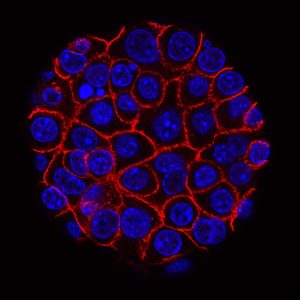
Pfizer’s Talzenna approved in Europe for HER2- advanced breast cancer with gBRCA1/2 mutations
pharmafile | June 24, 2019 | News story | Sales and Marketing | Pfizer, breast cancer, oncology, pharma
Pfizer’s oral poly (ADP-ribose) polymerase (PARP) inhibitor Talzenna (talazoparib) has secured approval in Europe from the European Commission, the drugmaker has confirmed, as a monotherapy for the treatment of human epidermal growth factor receptor 2-negative (HER2-) locally advanced (LA) or metastatic breast cancer (MBC) in adult patients with germline breast cancer susceptibility gene (gBRCA)1/2-mutations.
The manufacturer also noted that eligible patients “should have been previously treated with an anthracycline and/or a taxane in the (neo)adjuvant, locally advanced or metastatic setting unless patients were not suitable for these treatments,” while HR+ breast cancer patients should have already received treatment with a prior endocrine-based therapy or be ineligible for such treatment.
Data submitted in support of the decision was derived from the largest Phase 3 study of a PARP inhibitor in gBRCA-mutated, HER2- LA or MBC. It was shown that Talzenna “significantly outperformed” physician’s choice of standard chemotherapy (capecitabine, eribulin, gemcitabine or vinorelbine), extending median progression-free survival to 8.6 months compared to 5.6 months across triple-negative or HR+/HER2- breast cancer patients, as well as those who received prior cytotoxic chemo regimens or those with or without a history of CNS metastasis.
“In the Embraca trial, Talzenna reduced the risk of disease progression by 46% and more than doubled the overall response rate compared to chemotherapy,” said Dr Johannes Ettl, Department of Obstetrics and Gynecology, Klinikum rechts der Isar, Technical University of Munich in Germany and an investigator in the trial. “This improvement in outcomes for patients treated with Talzenna reinforces the increasingly key role of genetic testing in treatment decision-making for patients with locally advanced or metastatic breast cancer.”
Dr Andreas Penk, Regional President, Oncology International Developed Markets at Pfizer, added: “Today’s approval of Talzenna for certain patients with advanced-stage breast cancer and an inherited BRCA mutation is the latest example of our successful precision medicine approach to drug development. This important milestone builds on Pfizer’s decades-long legacy of developing therapies that improve outcomes for patients with breast cancer. We are thrilled that we can now offer these patients in Europe, who are often diagnosed at a younger age and have limited treatment options, an effective, once-daily, alternative treatment to chemotherapy.”
The EC’s decision comes on the heels of an approval decision in the same indication from the FDA in October last year.
Matt Fellows
Related Content

FDA accepts BLA for AstraZeneca and Daiichi Sankyo’s datopotamab deruxtecan for breast cancer treatment
AstraZeneca and Daiichi Sankyo have announced that their Biologics License Application (BLA) for datopotamab deruxtecan …

Curve Therapeutics’ CSO publishes research on HIF inhibition for cancer treatment
Curve Therapeutics has announced that its chief scientific officer, Professor Ali Tavassoli has published research …

Pfizer’s Velsipity approved by EC for ulcerative colitis treatment
Pfizer has announced that the European Commission (EC) has granted marketing authorisation for Velsipity (etrasimod) …








